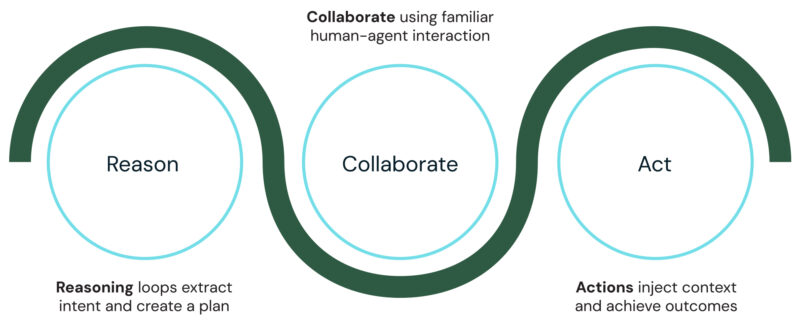A new paradigm to enable enterprise automation
AI knowledge workers are entering the workforce for the first time. This will present a significant shift in how we interact and work together with artificial intelligence. AI agents, the technology enabling this shift, are powered by breakthroughs in large language models and AI application engineering.
So far, we have used generative AI for text generation and summarization, and some of the biggest productivity gains have been seen in areas such as content creation through various copilot assistants.
While AI agents use the same underlying Large Language Models (LLMs), their capabilities vastly differ from what we are used to. In this article, we will unpack what an AI agent is and how it is used to transform enterprise knowledge work.
The fundamentals of intelligent AI agents
AI agent is an entirely new software paradigm that did not exist before LLMs. It is an application that can reason, collaborate, and act in a way that is very similar to how humans work. These three capabilities distinguish an AI agent from other types of AI applications.

Reasoning – Agents follow a human-like thought process of breaking down work into smaller sub-tasks and plans. They operate based on their runbooks, instructions, and training that provide guardrails for keeping the agent focused on its mission.
The power of agents comes from this design pattern that effectively leverages LLMs’ reasoning capabilities. Compared to ChatGPT style assistants, agents use multiple LLM calls during a single task iteration instead of relying on getting everything right on the first attempt.
Agents are “trained” to perform their work by providing them instructions in English rather than teaching them with thousands of examples like we have come to expect in machine learning.
Collaboration – Agents use natural language to communicate and collaborate with everything around them and seamlessly integrate into how we already do work. In fact, even agent-to-agent (multi-agent) collaboration is coordinated through natural language.
This makes human-to-agent interactions feel natural. An agent can reach out to a human colleague through regular messaging apps, like Teams or Slack, when it needs their feedback and guidance – Just like any other colleague would. Of course, not every interaction has to happen in a chat window. Specific agent use-cases will benefit from dedicated agent interfaces and dashboards for managing their work. Some agents will be easier to manage through voice interaction.
Action – Agents utilize various tools and actions to perform tasks and enhance their problem-solving capabilities. Tools such as a web browser provide open-ended functionalities that allow agents to gather real-time information. Actions extend these capabilities, enabling agents to interact with external data sources and real-world applications effectively. For example, agents can access databases for up-to-date information, send and receive emails, or update a CRM system, thus augmenting their reasoning and adaptability to user needs.
To ensure security and compliance, an agent’s access is limited to only the necessary systems and resources. Strict access controls also help agents focus on their designated tasks instead of going on an unguided journey.
The role of artificial intelligence and AI agents in the enterprise
Every enterprise software product has added its own AI capabilities, and many AI point solutions are available to solve specific problems. You might think that AI will simply exist in every platform as a little star✨ icon in the input field or corner of the screen. But agents, just like human knowledge workers, distinctively work across applications and data silos. AI agent platforms have to be able to facilitate and govern this type of working pattern.
Agents are a natural fit for work that is well-defined in runbooks and manuals. If you can describe a job in an operating manual that can be handed to a temporary worker with enough background knowledge, then you know you can train an agent to do the work. Due to agents’ reasoning capabilities, agentic runbooks don’t need to be all-encompassing process definitions that describe every small detail. Just like knowledge workers, agents will use contextual information to fill in the gaps or reach out for assistance in uncertain situations.
Agents are currently debuting in areas such as customer service work – handling order return requests – and more complex domains like software engineering. Next, we will start seeing agents deployed in roles around finance and sales operations, HR and IT service desks, and virtually every business function where human knowledge workers are manually bridging the gap between multiple systems and data sources.
Expanding the scope of automation through agents:
| RPA | Task automation | “Input data from Excel to web form in AP software.” |
| Intelligent automation | Process automation | “Scan invoice to data with OCR and post to AP system.” |
| AI agents | Knowledge work automation | “Read and auto-approve invoices per company policy.” |
| Multi-agent systems | Work function automation | “AI workers for invoice intake, approval, and payments.” |
As we get more comfortable with agents completing small tasks for us, we will see them grow to larger roles. Eventually, enterprises will have hundreds or even thousands of agents working and collaborating with human knowledge workers. Since agents communicate with natural language, they can just as easily interact with other agents. Over time, some work functions might be replaced entirely by multi-agent systems and AI-enhanced software that collaborates under human oversight.
Even though we are early in this development, it is easy to see how agents will drive the next big wave of enterprise transformation. Companies that embrace AI agents will see:
- Better customer and employee experience
- Resilience to change and better reaction speed to changing market conditions
- Unit economics and operational efficiency that cannot be matched otherwise
- Superior regulatory compliance
Exponential growth of enterprise AI
Generative AI technology has entered a period of unprecedented, exponential growth. In the past, every time technology advanced this quickly, we underestimated the breadth and speed of the changes it could bring.
We have a completely new capability that allows computers to understand, process, and reason about natural language in a way that seems almost human, and we are just starting to scratch the surface of what we can achieve with it. What was unimaginable two years ago has become normalized, and we will see the same leap forward in the coming two years.
Enterprise AI agents are here to transform how companies operate, how value is created and captured, and fundamentally change how we work.

